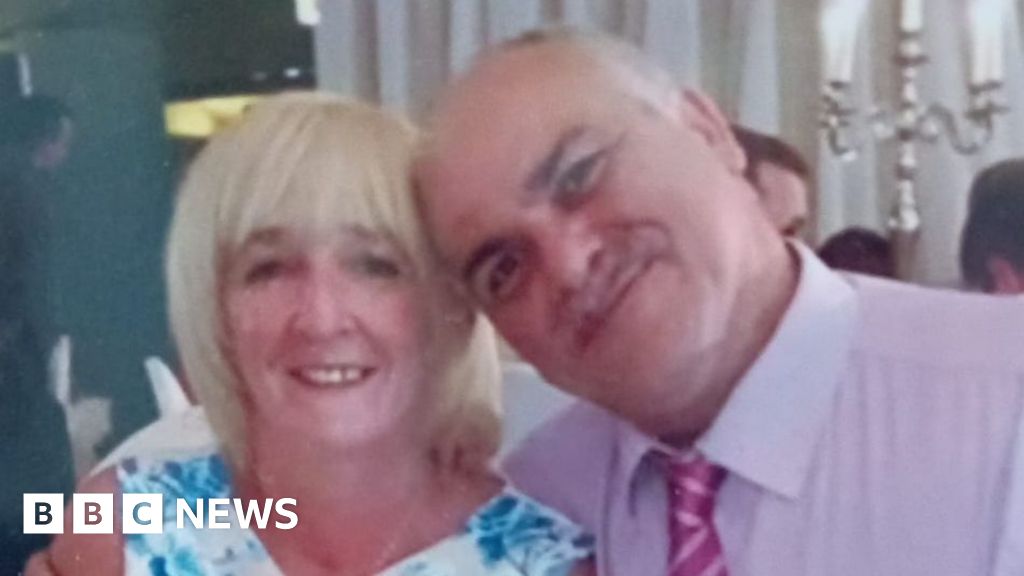A grieving woman who was told to examine her husband to confirm he was dead has said it remains in her mind every time she closes her eyes. When Catherine Steele's husband Anthony died from stomach cancer in May, she called an ambulance but was told none were available. She was asked to make a video call and check her husband's vital signs to confirm he had died. The Northern Ireland Ambulance Service (NIAS) apologised and said: "We are sorry that she did not experience the level of service that she would rightly expect at this particularly difficult time." Health Minister Mike Nesbitt also apologised and promised to investigate how the incident happened and "seek assurances for the future". Mr Steele, who was from north Belfast, was diagnosed with stomach cancer in October 2024. The 61-year-old died on 25 May and his wife called a 24-hour district nurse helpline to ask for assistance. No one picked up and her sister then called 999. Mrs Steele's sister was told an ambulance would be sent out but none arrived. Her sister then had to leave to pick up Mrs Steele's son from work, leaving her alone with her husband. Mrs Steele later received a call to say an ambulance would not be arriving and was asked to take part in a video call. "I had to do his pulse on his wrists, and on his neck and then I had to open his eyes up on the video call so she could see,"Mrs Steele told BBC Radio Ulster's Nolan Show. It was then the medical professional on the call confirmed Mrs Steele's husband was dead. She was asked to contact a doctor, who sent out the district nurse. "It's just my last memory of him and it's just in my mind every time I close my eyes," she said. "It's not acceptable, I know the ambulance service and the NHS is under strain but I just feel it should never happen again. "I don't want this to happen to anybody." Mrs Steele said she had been prescribed sleeping tablets due to suffering from insomnia since the incident. "I just close my eyes and see his eyes, and it just replays back and back and back on your mind." In a statement, the NIAS said: "We will contact Mrs Steele to arrange to meet her and apologise to her in person and, more importantly, to listen to her concerns that we might learn from her experience to help ensure that no-one else would have to go through the same."
Woman asked during 999 call to examine husband to confirm his death
TruthLens AI Suggested Headline:
"Northern Ireland Woman Shares Trauma After Confirming Husband's Death via Video Call"
TruthLens AI Summary
Catherine Steele, a woman from Northern Ireland, has shared the traumatic experience she endured following the death of her husband, Anthony, from stomach cancer in May. After calling an ambulance due to her husband's condition, she was informed that none were available. Instead of receiving immediate assistance, she was instructed to participate in a video call to confirm her husband's death. This call led her to take on the heartbreaking task of checking his vital signs and even opening his eyes, all while she was in distress. The medical professional on the call ultimately confirmed that Anthony had passed away, a moment that has since haunted Catherine. She expressed the emotional toll of this experience, stating that it replayed in her mind every time she closed her eyes, and highlighted the inadequacy of the emergency response she received during such a critical time.
The Northern Ireland Ambulance Service (NIAS) has since apologized for the distressing situation and acknowledged that Catherine did not receive the level of care expected during such a difficult period. Health Minister Mike Nesbitt has also issued an apology and pledged to investigate the circumstances surrounding the incident. Catherine's husband was diagnosed with cancer in October 2024, and despite her attempts to seek help through a 24-hour district nurse helpline, she was met with silence. After her sister called 999, they were informed that an ambulance would not be arriving, leaving Catherine alone with her husband's body. The NIAS has committed to reaching out to Catherine for a personal apology and to understand her concerns to prevent similar occurrences in the future. Catherine has since struggled with insomnia and has been prescribed sleeping tablets, as the painful memories of her last moments with her husband continue to affect her daily life. She hopes that no one else will have to endure a similar experience.
TruthLens AI Analysis
You need to be a member to generate the AI analysis for this article.
Log In to Generate AnalysisNot a member yet? Register for free.
